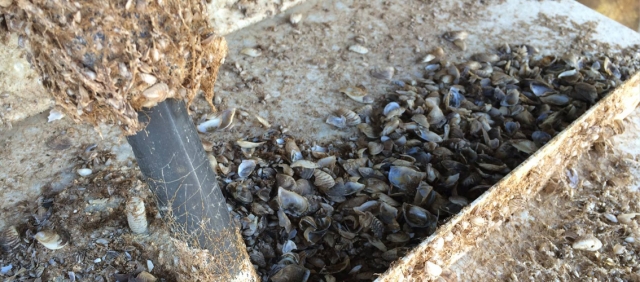Fighting invasive mussels receives $3 million influx of funds
No matter what Mother Nature is throwing at us this spring, better weather is on its way.
And as the boating season approaches, the B.C. government is once again adding to its arsenal in the fight to keep B.C. invasive mussel free by adding two new inspection stations, expanding inspection hours and the inspection operating season, more than doubling the number of inspectors, increasing public education, expanding scientific lake monitoring and providing Canada’s first multi-purpose mussel-sniffing dog.
Two brand new border inspection stations will open at Yahk and Midway, bringing the total number of inspections stations in B.C. to 10 locations.
The province’s busiest station at Golden will be open 24 hours. The remaining nine stations will have their hours extended generally from dawn to dusk however actual opening and closing times will vary to help ensure compliance. The inspection operating season will now run from mid-March until mid-November.
“Invasive mussels have spread to provinces and states throughout North America – but not yet in B.C., and we’re focused on keeping it that way,” said Premier Christy Clark. “That’s why we’re adding more inspection stations, extended hours and staff, and Canada’s first multi-purpose mussel-sniffing dog – to protect our most precious resource, our waterways.”
To support the new stations and extended hours, the Province is also adding 35 inspection officers to the program, bringing the total to 68 auxiliary conservation officers.
In addition, the Province is providing the Habitat Conservation Trust Foundation with three years of support to expand government’s ongoing invasive mussel lake monitoring to detect potential invasive mussel larvae. This will help build capacity for local stewardship groups to become involved in early detection; a critical first step in preventing invasive mussels from becoming established.
“This new funding will help keep invasive mussels out of B.C.’s waterways,” said Forests, Lands and Natural Resource Operations Minister and MLA for Kelowna-Mission Steve Thomson. “We can’t allow these species to enter our province, due to the negative impacts they could have on infrastructure and on sensitive ecosystems.”
The Province is also unleashing a new and unique tool to fight invasive mussels, Canada’s first multi-purpose mussel detection dog. Kilo, a German Shepherd Dog, is currently undergoing training to sniff out mussels as well as firearms, bear parts, and will also be used in evidence recovery cases. Beginning July 1, Kilo will be working with his Conservation Officer handler at high volume stations on a rotating basis to help detect invasive mussels.
Funding for the ongoing mussel defence program announced today is valued at approximately $3 million.
It includes:
- $2.45 million, primarily for the increased staffing.
- $450,000 over three years to the Habitat Conservation Trust Foundation for the lake monitoring program; and
- $170,000 for equipment for the enhanced program.
This brings the total program funding to $4.5 million annually, with partner funding from BC Hydro, Columbia Power, Fortis BC, and Columbia Basin Trust.
“The Invasive Species Council of BC is delighted to see the government’s increased investment in the battle against aquatic invasive species.” said Dr. Brian Heise, Invasive Species Council chair.
“Invasive mussels threaten critical salmon habitat, damage infrastructure, and prevent full recreational use of our lakes and beaches. We look forward to working with government and our local partners in getting British Columbians to Clean, Drain, Dry their boats and fishing gear.”
It is illegal to transport invasive mussels anywhere in B.C. and it is mandatory for motorists with watercraft to report to an inspection station during operating hours. Motorists who fail to stop at an inspection station can be fined $345. Outside of operating hours, signage will direct motorists to report information about where they are arriving from, their destination in B.C. and to what extent they’ve taken steps to ensure they are not transporting invasive mussels.
Conservation officers will be increasing enforcement of existing penalties, which can include fines up to $50,000 for a first offense for illegally transporting mussels anywhere in B.C.
The Province will also continue to work with the Canada Border Services Agency to strengthen the screening of all watercraft entering from the United States, and intercept high risk watercraft at border crossings.
Through the Province’s expanded Invasive Mussel Defence Program, crews in 2016 inspected a record 24,500 watercraft for invasive quagga and zebra mussels, helping B.C. to remain free of invasive mussels.
Zebra and quagga mussels can significantly alter the food web resulting in the collapse of native fish populations including sockeye salmon. They can clog pipes and water systems and can ultimately affect municipal and industrial water supplies. The economic impact of invasive mussels to hydropower, agricultural irrigation, municipal water supplies and recreational boating has been estimated to be $43 million annually. They also have a reputation of decreasing the quality of the recreational experience, impacting tourism.
Quick Facts:
- A mobile trailer featuring visuals of the Clean, Drain, Dry program is travelling throughout B.C. providing public awareness about invasive mussels.
- During the 2016 boating season, the program inspected 24,500 boats and interacted with 50,000 people at the inspection stations.
- Boats were identified as traveling into B.C. from 58 different provinces, territories and states.
- The program intercepted 685 boats from high risk provinces or states and intercepted 17 mussel fouled boats.






















